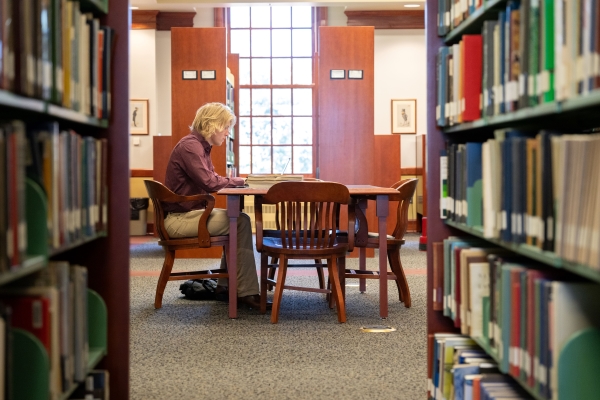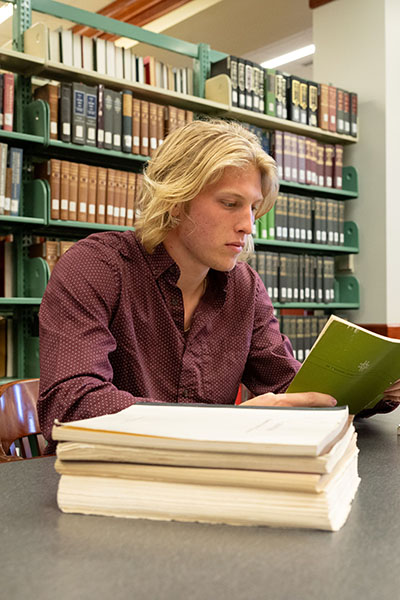Hampden-Sydney College boasts a storied past, offering students a rich environment for growth both on and off campus. Recognized for its commitment to delivering an outstanding education, the College provides various avenues for research that echo its mission to form good men and good citizens. Among these avenues is the Summer Research Program, which empowers students to explore their passions and expand their understanding of a subject close to their hearts. This opportunity struck a chord with history and religion major Bryson Smith ’24, as he immersed himself in the historical context of the Hampden-Sydney College curriculum during the summer of 2023.
"This opportunity presented itself as an ideal way to delve into a historic curriculum," Bryson said. "I've been intrigued by this topic for as long as I can remember, and this was my initial exposure to such a vast academic history, which pushed me to explore as much as I could and understand the changes that have taken place.”
Excited to dive into the subject, Bryson devised a strategy to explore the extensive history of the Hampden-Sydney curriculum. His objectives included outlining the changes that have been made to the curriculum since 1957, determining whether the College is fulfilling its mission statement and niche as a liberal arts college for men, and presenting his findings to the current faculty members. To accomplish this, he examined records from as far back as the 1950s including catalogs from 1957 to 2010, strategic plans beginning in 1986, and faculty records dating from 1977 to now.
“Starting my review in the 1950s was ideal because majors had received faculty approval and were introduced over the following decade,” Bryson said. “From 1957 to 1967, the curriculum gradually changed to match some of the current standards. This compelled me to explore those years further.”
During the 1950s and 1960s, there was a significant opportunity for students to engage in diverse course offerings. Bryson noted that in the late 1950s, there were courses that emphasized the College's Presbyterian religious affiliation, alongside offerings in modern and ancient languages. It was not until 1972 that majors were formally introduced in a catalog, which featured a variety of interdisciplinary fields such as biophysics, biochemistry, biblical studies, philosophy, and economics with mathematics.
“I thought it was particularly interesting to see the many interdisciplinary majors available at the time,” Bryson said. “As we continue to evolve, it is fascinating to note similarities in the offerings and areas of study.”

Apart from examining catalogs, strategic plans, and faculty minutes, Bryson conducted interviews with 11 professors, including current faculty members and emeritus faculty, to gather comparative perspectives on the current and past curriculum. His interviews revealed shifts in faculty workload over time, reflecting changes in the number of credits taught per semester. He pinpointed the introduction of new courses such as Western Culture and Rhetoric as significant alterations in the curriculum, alongside the implementation of the Compass Program.
“Upon learning from the faculty about the recent changes, I found myself inspired to share my own insights regarding the essence of a Hampden-Sydney education,” Bryson said. “As a student, I felt confident in my ability to share thoughts with faculty members and explore the curriculum more profoundly to achieve my objectives."
With the hopes of creating a unified core curriculum that reflects the College's mission and provides a solid knowledge base embraced by both students and alumni, Bryson offered insights regarding the College's distribution requirements and criteria for credit fulfillment. He particularly emphasized areas such as Western Culture, American Studies, Rhetoric, and International Studies. While valuing creativity, Bryson also acknowledged the unique opportunity to leverage courses centered on cultivating qualities of good men and good citizens in an all-male institution. He suggested the development of courses focusing on these attributes, including the potential inclusion of topics related to being good parents.
“I believe the core of the curriculum should ultimately reflect our mission statement and the goals of the College,” Bryson emphasized. “We have a rare opportunity to include courses around being a good man, a good citizen, and other related topics, such as being a good parent—topics that we encounter throughout our lives.”
Bryson's dedication to understanding and shaping the educational landscape through his research and recommendations underscores his unique vision and commitment to making a lasting impact in the lives of his peers. With aspirations to establish charter schools in the future, his careful review of the Hampden-Sydney curriculum evolution and innovative suggestions for course development demonstrate his forward-thinking and creative approach. As Bryson prepares for graduation in the spring, he has his sights set on the future, eagerly seeking opportunities to further enhance his experience, and positioning himself for success in the realm of education.


